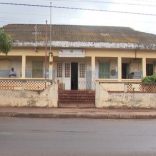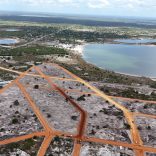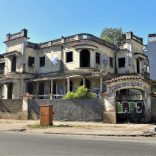Mozambique: 100-year-old ruin still serves as a rural hospital in Chibuto - report
Legal Alert: The prohibition of alienation of real estate to foreigners – Mozambique

File photo
After the country’s independence, in 1975, the Mozambican State, motivated by its interest in assuring housing for all citizens, and taking into account the abandonment of some residential and commercial buildings by its owners, proceeded to the nationalisation of real estate (income buildings or part of them (1), through Decree-Law no. 5/76, of February 5.
Under the terms of this legal instrument, they have reverted to the State:
- The ownership of real estate belonging to foreigners who were not domiciled in Mozambique (2);
- The ownership of real estate owned by Mozambicans residing abroad who were not in the service of the country or who were not duly authorised by the competent authorities to reside abroad and did not request such authorisation within 180 (one hundred and eighty) days as of the date of publication of this Decree-Law;
- The ownership of real estate belonging to legal entities or foreign companies (3); and
- The shares or social participations in real estate companies of foreigners not resident in Mozambique.
This Decree-Law also established a prohibition on the sale, transfer, exchange, donation, encumbrance or any form of alienation of real estate, without the prior authorisation of the State, which always enjoyed the right of first refusal.
After almost a decade and a half, and with the approval of a new Constitution of the Republic, the gradual change of the economic paradigm (transition to a so-called market economy), the loss of the State’s power/interventional character, and concretely, as regards this matter, in view of the high costs of maintaining the State’s properties, the latter decided to proceed with the sale of real estate and did so through Law no. 5/91, of January 9, which granted national tenants, in a regular contractual situation, the right to request the onerous acquisition of such real estate. On the other hand, legal or natural persons were allowed to construct buildings for sale or lease or to carry out other activities related to real estate rights, provided that they are duly authorised to do so.
Following this “opening”, Decree no. 2/91, of January 16, determined the procedures for the alienation of real estate above referred, reiterating the idea that legal persons whose share capital was/is mainly foreign were/are considered to be foreign legal persons and, as such, and in the same way as foreign natural persons, could not/cannot acquire the State’s property, since this is a right reserved only to national (natural or legal) persons. Still in this line, this same Decree, in its article 16, establishes that future transfers of ownership of the State’s real estate are only possible in favour of national citizens and companies, thus prohibiting any possibility of transmission of these properties (which were under the direct administration of the State) in favour of foreign (natural or legal) persons.
As a way of ensuring compliance with this imperative, Ministerial Diploma no. 152/92, of September 30, which regulates the operation system of the process of evaluation and alienation of housing real estate of the State, requires, for the process of purchase of the property, a document proving the national citizenship of the tenant and reiterates the principle that the alienation process only benefits national tenants.
This prohibition extends to real estate in ruins and unfinished real estate, which have reverted to the State under Decree-Law no. 5/76, of February 5, inasmuch as, and in accordance with Article 2 of Ministerial Diploma no. 97/92, of July 8, the alienation of ruined or unfinished buildings, as well as their future transmission, may only be made to national citizens or companies.
In view of the foregoing, we can deduce that, on all the buildings that have been nationalised, a burden of non-transferability is imposed on foreigners, by virtue of the aforementioned legal provisions.
While it is true that these Laws were approved in a period with their social, economic and political peculiarities (post-independence), in which the State was concerned, among other things, in assuring housing for the national citizens, nowadays, in the era of globalisation and in view of the economic, social, cultural and other dynamics, this prohibition is most probably no longer justified and/or not in line with the status quo. But this prohibition remains part of our legal framework and as such must be acknowledged and taken into account, for example, in the acquisition of an autonomous fraction in a building constructed on a site where a ruined building was implanted (with the burden of nontransferability to foreigners). In these cases, the understanding of the Maputo’s Real Estate Registrar Office is that, on the residential real estate, built on a land where a building in ruins was implanted previously, the burden of non-transferability to foreigners lies. The solution is different when it comes to real estate built for commercial purposes (offices and shops), in which case such limitation does not exist. This distinction, however, does not result from the Law, but it is the prevailing understanding of the referred entity.
It is, therefore, prudent, at all levels and for all stakeholders (work owners, property buyers, real estate brokerage companies, among others), especially for the above-mentioned foreigners, better defined in the listed and in force legislation, to always have into account the existence or not of this burden, otherwise it will not be possible to conclude the desired legal transactions, the object of which being the real estate with the burden of nontransferability to foreigners.
Of particular interest are the cases of office buildings (or for offices and residential purposes), built on a ruin with the burden of non-transferability to foreigners, given the already mentioned practical differentiation (without legal support) made by the Maputo Real Estate Registrar Office.
It is therefore crucial, in this last scenario (but not limited to), that the interested parties request an opinion to the relevant entity, in order to better assert their rights and, above all, to have greater certainty and legal security in the business they intend to enter into.
By Nipul K. Govan | [email protected]
and
By Ana Berta Mazuze [email protected]
(1) For the purposes of this Decree-Law, income buildings were all buildings that, intended for housing or other purposes (such as commerce, industry or agriculture), were not occupied by their owners or usufructuaries.
(2) For the purposes of this Decree-Law, foreigners not domiciled in Mozambique were foreigners who would be absent for a period of more than 90 (ninety) days, without being duly authorized to do so by the relevant entity.
(3) For the purposes of this Decree-Law, legal persons or foreign companies were those whose majority of the share capital or shareholders were foreigners. Legal entities or foreign companies that, being legally authorized to carry out their activities in Mozambique, needed their respective properties for the pursuit of its corporate purpose were excluded from this definition.












Leave a Reply
Be the First to Comment!
You must be logged in to post a comment.
You must be logged in to post a comment.